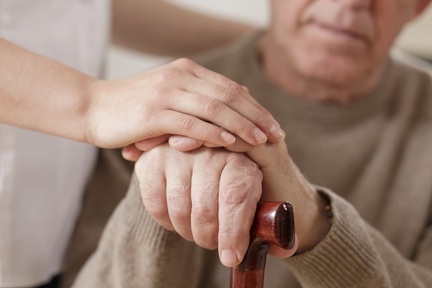People living with Parkinson's disease 'forced' to hide their emotions
Almost two-fifths of people in the UK with Parkinson's disease hide their symptoms or lie about having the condition, new research has revealed.

To mark Parkinson's Awareness Week (18-24 April), Parkinson's UK have revealed an ‘alarming’ level of fear surrounding the disorder, with an estimated 42,000 people delaying sharing their diagnosis with someone close to them.
A total of 127,000 people in the UK live with Parkinson's, a progressive brain disease that causes uncontrollable tremors, slow movement, and impaired speech.
Parkinson's UK chief executive Steve Ford said: “No one should feel alone in dealing with a diagnosis of Parkinson's. Too many people are struggling with their diagnosis alone because of fear of what people might think, say or do.
“It's worrying that many people with Parkinson's, for a wide range of reasons, are not able to access the help they need - and it's having a devastating impact on their emotional health.
“We are determined that each and every person with Parkinson's is aware of the support available so they can feel equipped to have these difficult conversations.”
A total of 1,868 individuals living with Parkinson's were questioned by ComRes about their experiences of sharing their diagnosis and condition with their friends, family or colleagues.
More than a third said they had experienced negative emotions during the year following their diagnosis and others reported feeling as if ‘their world had ended', or 'they didn't know who to turn to'.
A total of 37 per cent had felt it necessary to hide their symptoms while 63 per cent wanted to avoid people feeling awkward or embarrassed around them.
Furthermore, nearly a third (32 per cent) of those surveyed did not feel that their symptoms were socially acceptable as they were worried they may be judged.
Wildlife photographer David Plummer, aged 47, from Henfield, West Sussex, was diagnosed with Parkinson's disease and felt ‘completely dazed’.
He added: “There are a few people I told quickly but after that I didn't announce it. I'll often try to hide it if my symptoms are showing, as sometimes it's embarrassing.
“When going out in social situations it's not something you want to say first off. A part of me wants to hide it.”
Most people with Parkinson's start to develop symptoms when they are over 50-years-old, although around one in 20 people with the condition first experience symptoms when they are under 40.
Parkinson's disease is caused by a loss of nerve cells in part of the brain called the substantia nigra. This leads to a reduction in the amount of a chemical called dopamine in the brain.
The three main symptoms of Parkinson's disease are: tremor (involuntary shaking of particular parts of the body), slow movement and stiff and inflexible muscles.
A person living with Parkinson's disease can also experience a wide range of other physical and psychological symptoms, including: depression, constipation, problems sleeping (insomnia), loss of sense of smell (anosmia) and memory problems.
Steve Ford, chief executive at Parkinson's UK said: “Parkinson's UK is here to help people find the support they need, when they need it.
“We know that the right support, whether through family, friends or Parkinson's UK, is vital for those with the condition, to help them come to terms with their diagnosis and know that they're not alone.
“We are here to help people find the support they need, when they need it.”
As part of Parkinson’s Awareness Week, the charity are encouraging people to share the things that make a difference to life with Parkinson's using #Parkinsonsin1.
For more information visit: http://www.parkinsons.org.uk/content/parkinsons-awareness-week-18-24-april-2016
Latest News
 29-Jul-24
Dementia Bus gives carehome.co.uk staff insight into life with dementia
29-Jul-24
Dementia Bus gives carehome.co.uk staff insight into life with dementia
 01-Mar-24
Find out the top care homes in 2024
01-Mar-24
Find out the top care homes in 2024
 21-Mar-23
UK's top care homes in 2023 revealed
21-Mar-23
UK's top care homes in 2023 revealed
 03-Jan-23
carehome.co.uk launches free care helpline
03-Jan-23
carehome.co.uk launches free care helpline
 13-Dec-22
5 mins with Emily Whitehurst, chief operating officer for Constantia Healthcare
13-Dec-22
5 mins with Emily Whitehurst, chief operating officer for Constantia Healthcare